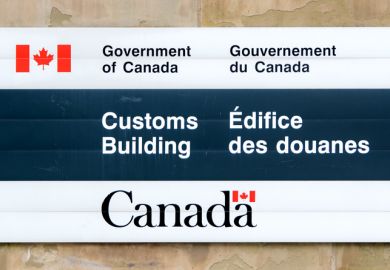The Trudeau administration is preparing an overhaul of visa policies that aims, among other objectives, to more strategically distribute international students around Canada.
The administration said it was taking the step to help both the communities across the country that appear to be overwhelmed by international student arrivals, and those areas that might not be getting enough.
The federal government hopes to do a better job of “ensuring the benefits of immigration are spread to all regions of the country”, said a spokesman for Immigration, Refugees and Citizenship Canada (IRCC).
Canada has long been one of the world’s top destinations for overseas students. In a country of about 38 million people, the IRCC has seen study permit applications from abroad more than double since 2017, from 313,000 requests to record levels of nearly 550,000 applicants in 2021 and 715,000 last year.
Yet with the benefits – including the heavy subsidisation of Canada’s higher education system by international students paying several times the tuition rates of their domestic classmates – have come some challenges in areas that include regional housing shortfalls, cases of visa fraud, and more general political anxieties tied to race and culture, economic competitiveness and national security.
Canadian officials have reported several instances in recent months where they blocked post-secondary institutions from hosting international students, typically from India, because the institutions had unusually large numbers of people with student visas not attending classes, going straight into jobs or immediately applying for asylum.
The federal immigration minister, Sean Fraser, responded to that situation by announcing that the government would allow all visa holders associated with those institutions to remain in Canada while their cases are examined on an individual basis, to learn who might have been willing participants in any kind of fraudulent visa application efforts.
More generally, however, Mr Fraser has argued that immigrants can actually help to address problems such as housing shortages, by bringing the skills and labour necessary to help Canadian industries, including construction.
The nation’s main association for foreign student exchange, the Canadian Bureau for International Education (CBIE), has been urging the Trudeau government to lead a more strategic approach, but with a particular emphasis on student needs. Current planning agreements between the federal and provincial governments, the CBIE said in its formal contribution to the Trudeau policy reassessment, “make no reference to international students in Canada, how to plan for meeting their needs for housing, social, health and mental services, nor how they can help bridge talent gaps or meet provincial immigration targets”.
The Trudeau administration also has shown growing signs of concern about the possibility of foreign espionage aimed at Canada’s research universities. It has begun setting up a system through which people acting on behalf of foreign governments would have to register that affiliation.
That move has generated protests from the nation’s main faculty association, the Canadian Association of University Teachers (CAUT), which has argued that the system could silence legitimate political criticism. The terms, said CAUT’s executive director, David Robinson, could threaten repercussions for something as benign as an academic writing a newspaper editorial.
Mr Robinson also endorsed steps to restrain institutions that have taken too many students from abroad. Examples, he said, include Cape Breton University in Nova Scotia, which admitted so many students from abroad – nearly 4,000 last academic year, out of a total enrolment of just under 6,000 – that it began holding some classes in a movie theatre.
Too often, Mr Robinson said, international students in Canada “are treated as cash cows, often treated badly, and given little support”.
Register to continue
Why register?
- Registration is free and only takes a moment
- Once registered, you can read 3 articles a month
- Sign up for our newsletter
Subscribe
Or subscribe for unlimited access to:
- Unlimited access to news, views, insights & reviews
- Digital editions
- Digital access to THE’s university and college rankings analysis
Already registered or a current subscriber?








